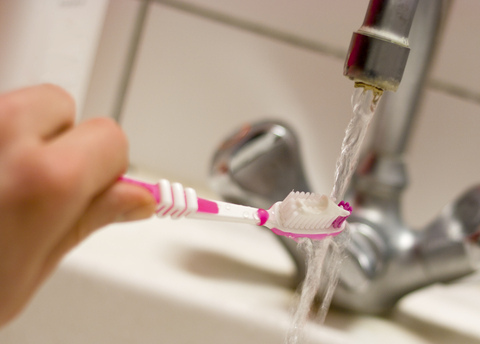March 24th, 2017

Dr. Dale Scharine and Dr. Alissa Edwards and our team at Elite Smiles Dental frequently field questions about cavities and what causes them. Patients will typically ask, “I brush twice a day and floss regularly, as well as rinse with hydrogen peroxide, so a cavity is unlikely, right?”
Not quite.
When cavities, also known as caries, are in their initial stages, people often will feel no symptoms, and they won’t experience any pain or discomfort. It’s not until the tooth decay has reached a certain level that patients begin to notice the signs. If you are experiencing any of the following symptoms, you may want to consider scheduling an appointment with Dr. Dale Scharine and Dr. Alissa Edwards as soon as possible:
- Dull or sharp toothache
- Tooth sensitivity or mild to sharp pain when eating or drinking something sweet, hot, or cold
- Persistent bad breath or a bad taste in the mouth
- The presence of a sticky, tarry feeling when biting down
- Puss or discharge around a tooth, especially when pressing on your gums
- Visible holes or discoloration in your teeth (usually black or brown)
Cavities can happen at any time, to anyone, no matter how old you are. Routine dental care is important to prevent cavities or the onset of tooth decay, so it is important to visit Dr. Dale Scharine and Dr. Alissa Edwards and our team at Elite Smiles Dental for regular cleanings. If you are overdue for a checkup or think you may have a cavity, please give us a call at Appleton, WI office to schedule an appointment.
March 17th, 2017

Cancer has become a common word, and it seems like there is new research about it every day. We know antioxidants are important. We know some cancers are more treatable than others. We know some lifestyles and habits contribute to our cancer risk.
Smoking increases our risk of cancer, as does walking through a radioactive power plant. But there is a direct link to oral cancer that you many may not know about—the link between HPV (Human Papilloma Virus) and oral cancer.
This may come as a shock because it has been almost a taboo subject for some time. A person with HPV is at an extremely high risk of developing oral cancer. In fact, smoking is now second to HPV in causing oral cancer!
According to the Oral Cancer Foundation, “The human papilloma virus, particularly version 16, has now been shown to be sexually transmitted between partners, and is conclusively implicated in the increasing incidence of young non-smoking oral cancer patients. This is the same virus that is the causative agent, along with other versions of the virus, in more than 90% of all cervical cancers. It is the foundation's belief, based on recent revelations in peer reviewed published data in the last few years, that in people under the age of 50, HPV16 may even be replacing tobacco as the primary causative agent in the initiation of the disease process.” [http://www.oralcancerfoundation.org/facts/]
There is a test and a vaccine for HPV; please discuss it with your physician.
There are some devices that help detect oral cancer in its earliest forms. We all know that the survival rate for someone with cancer depends greatly on what stage the cancer is diagnosed. Talk to Dr. Dale Scharine and Dr. Alissa Edwards if you have any concerns.
Please be aware and remember that when it comes to your own health, knowledge is power. When you have the knowledge to make an informed decision, you can make positive changes in your life. The mouth is an entry point for your body. Care for your mouth and it will care for you!
March 10th, 2017

According to the American Association of Pediatric Density, roughly one in five children suffers from canker sores. Canker sores are small sores that appear inside the cheeks, on the lips, on the surface of the gums, and under the tongue.
Even though, canker sores are not contagious, they do tend to run in families. There are several reasons your child may be suffering from canker sores including:
- Children who have Vitamin B12, iron, and folic acid deficiencies tend to get canker sores more often than children who have normal levels of these vitamins and minerals.
- Children who suffer from food allergies are also at a higher risk for developing canker sores. It’s difficult to determine what your child may be allergic to. If you feel strongly that the canker sores are related to an allergy, then a visit to an allergist is highly recommended.
- Biting their lip or cheek can also result in a canker sore.
- Any injury to mouth, where the skin breaks can cause a canker sore.
- Brushing their teeth too hard can also be a problem.
- Your child may be sensitive to an ingredient in their toothpaste. Try switching toothpastes and see if it makes a difference.
- Emotional disturbances and stress are also factors to consider.
If your child has frequent canker sores a visit to our Appleton, WI office will be beneficial. Canker sores are painful and usually last about 14 days. Dr. Dale Scharine and Dr. Alissa Edwards may recommend one or a few of the following treatment options:
- Avoid food that is acidic, salty, and spicy.
- A toothbrush with soft bristles may be helpful.
- Avoid mouthwash and toothpaste that contain SLS.
- Do not feed your child foods that they may be allergic to.
Canker Sore Remedies
- Eating yogurt that contains Acidophilus will relieve the pain and help the canker sore heal faster.
- Put one teaspoon of baking soda in an eight-ounce glass of lukewarm water. Have your child gargle and swish it around his or her mouth several times a day. Not only does this remedy relieve the pain, the canker sore could be gone in as little as 24 hours.
- Place a wet tea bag on the sore and hold it there for a few minutes several times a day. This remedy will help with the pain and quickly heal the sore.
- Camphor, Benzocaine, Lidocaine, and Orajel are over-the-counter medications that can help.
If you have questions about your child’s canker sore, contact Dr. Dale Scharine and Dr. Alissa Edwards to schedule an appointment.
March 3rd, 2017

You may have heard talk about the germs that can reside on your toothbrush and thought, “really?”
It’s true—there are several kinds of bacteria that can lurk on the bristles of your toothbrush, including streptococci, staphylococci, Herpes Simplex I, and the Influenza virus. To protect your toothbrush from bacteria, Dr. Dale Scharine and Dr. Alissa Edwards and our team want you to consider the following three tips:
- Wash your hands before and after brushing.
- Allow the brush to air dry after each use, as harmful bacteria dies after being exposed to oxygen. It is best to disinfect your toothbrush weekly and allow it to dry in between use. Store the toothbrush in an upright position to allow water to drain and dry faster
- Replace your toothbrush every three to four months, or after being ill. Worn bristles are less effective in properly cleaning your teeth, and can actually be damaging to teeth if used too long!
We hope these tips help! Feel free to give us a call at our Appleton, WI office or ask us on Facebook if you have any questions!





 Website Powered by Sesame 24-7™
Website Powered by Sesame 24-7™